A large Australian flag flutters below her in a breeze coming off the Andaman Sea.
Across the street the Aussie Bar is crowded with young Australian drinkers, many of them bare top, who are shouting to be heard above music thumping from near-by girlie bars.
Away from the seedy red-light district of Patong beach it's boom-time on Phuket seven years after the Boxing Day tsunami hit southern Thailand with awesome savagery, killing more than 5000 people and wiping out the region's tourism industry.
Phuket international airport is being upgraded to accommodate 12.4 million visitors a year by November 2014.
The island once known as the ''Pearl of the Andaman Sea'' is undergoing a building frenzy with 43,000 hotel rooms open and at least 7000 more units in the pipeline.
But Larry Cunningham, Australia's honorary consul on the island, has spoken out about rip-offs, scams, criminal activities and bad behavior that are ruining the holidays of scores Australians, including a new wave of ''schoolies.'' [Holidaying high school grads.]
Up to 25,000 Australian tourists a month are now visiting Phuket, most of them arriving on cheap direct flights from Australia's capital cities, lured by the high Australian dollar and an exotic location.
''Many Australians come here behaving as if the same standards and laws apply in Thailand as they do in Australia,'' says Mr Cunningham, a property developer from Sydney who has lived on Phuket for 11 years.
''They have little idea about Thai culture and think that what happens in Australia happens here,'' he says.
Mr Cunningham, 62, knows that when the telephone rings at the exclusive Chava resort he built on Phuket's Surin Beach at night it is usually Thai authorities telling him more Australians have landed in trouble.
Up to 50 Australians a year die on Phuket, half of them from natural causes and the other half from motor bike and car accidents, misadventure or suicides.
Mr Cunningham estimates that about 80 percent of the cases where Australians find themselves in trouble are settled before he hears about them, often through extorted payments.
Australians sometimes find themselves in situations that make them ''scared for their lives,'' he says.
Unscrupulous jet-ski operators on Phuket have been ripping off customers for years.
They make false claims of damage to the skis and demand immediate payment.
''Thugs will surround the hirers, threatening physical harm or worse if they don't pay money,'' Mr Cunningham says.
''They have the hirers over a barrel because they handed them their passports,'' he says.
In the latest case last week two Australian women injured in a jet-ski crash were pursued by thugs who came to the hospital where they were being treated even though a South African man responsible for the crash had agreed to pay for the damage.
Similar scams involve the hiring of motorbikes.
Mr Cunningham says Australian ''schoolies'' coming to the island in increasing numbers are being preyed upon by Thai criminals, including corrupt police at so-called ''full moon'' parties, where they are often robbed after having their drinks spiked, set up and extorted for money or sexually assaulted.
''We have also had motor boats coming from the parties crashing, killing and maiming people;.these parties are dangerous and the kids should not attend them,'' he says.
Mr Cunningham tells the story of two young Australian men who awoke in an alley behind a bar 30 hours after their drinks were spiked.
All their valuables were gone.
An Australian man involved in a business dispute was wrongfully accused of sexually abusing a child.
While being held for 84 days in a Phuket jail he was told his throat would be cut if he did not put money into a bank account. He obliged.
One Australian had to pay $50,000 in hospital fees after coming off a motor cycle he rented.
His Australian insurer declined to pay the fees because he did not have a current Australian motorcycle licence.
The family of an 88-year-old Perth woman had to pay $30,000 to medivac her home after breaking her hip: she could not get travel insurance because of her age.
Many Australians get into trouble picking up escorts in bars only to discover at their hotel that their companion is actually a ''lady boy.''
''You couldn't print many of the stories,'' Mr Cunningham says.
Mr Cunningham says there have been an increasing number of cases where Australians have gone to the Thai police to make false claims of theft so they could claim insurance in Australia.
''Thai police view the making of false declarations very seriously,'' he says.
Mr Cunningham stresses he is not advising Australians to stay away from Phuket, which he says is a fabulous place with near-perfect beaches where they can enjoy the ''land of smiles'' culture.
''I'm just asking them to be aware of the possible pitfalls and avoid them,'' he says.
Mr Cunningham says surviving the tsunami and seeing its ''horrendous'' aftermath encouraged him to help Australians who get into trouble.
He was on a boat off Krabi, not far from Phuket, when the massive 9.2 metre wall of water smashed into southern Thailand about 11am Thailand time on Boxing Day 2004.
''I am a grandfather and I like to make a difference where I can,'' he says.
''I felt that as I spoke Thai I could do a lot to assist after the tsunami and when the honorary consul position was advertised the following year I applied for it,'' he says.
''The job can take huge personal toll but at other times it can be very rewarding.''
Along the Phuket coast luxurious resorts have been built where the tsunami crashed ashore, destroying once near-perfect beaches and villages.
Sitting beside a hotel swimming pool at Patong beach Juliette Law, 44, from Coffs Harbor, says she is not worried about another tsunami because the chance of one occurring again is small.
''Phuket is a terrific place for the family to come,'' says Mrs Law, a teacher in environmental science.
John Bassett, 61, and Nina Lahimann, 50, from Byron Bay, drove two hours north along the coast from Patong beach to Khao Lak, a white sand which in 2004 was the scene of utter devastation.
Sitting in a restaurant overlooking the beach where millions of you tube viewers saw the tsunami swamping a lone swimmer and then smashing into a restaurant, Mr Bassett says it is good to be away from the seedy part of Patong beach, which he likened to a ''zoo'' or the kingdoms of ''Sodom and Gomorrah.''
''We have come to this part of Thailand for the last two years. It's a beautiful place and it's a nice thought that our money is helping victims of the tsunami,'' he says.
First published in The Age, Melbourne, and the Sydney Morning Herald and republished on Phuketwan with permission. .

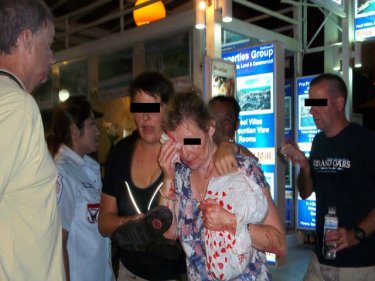
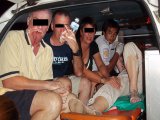
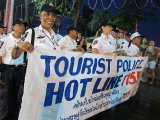

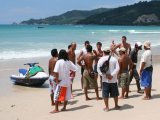
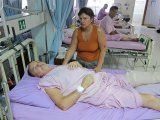


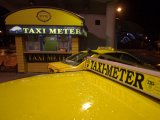




Mr Cunningham is very correct, many Aussies seem to travel overseas expecting the same laws and conditions they would find at home. Having said that I must state that giving a false report to police is an offence everywhere in Australia and doing the same in Thailand is not only an offence but also stupid. The person who drove a scooter without a valid licence in Australia is just a tool and the poor lady without travel insurance is unlucky however the Smart Traveller site run by the Australian Government does say that if you do not have travel insurance you should not travel.
Time must come when my compatriots finally learn that Thailand is different and they should abide by the culture and law of their hosts.
Posted by Arthur on December 26, 2011 07:07